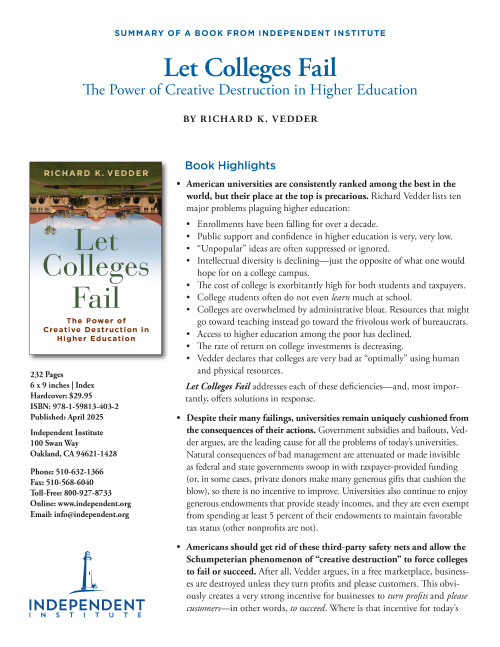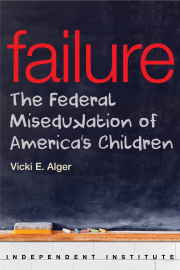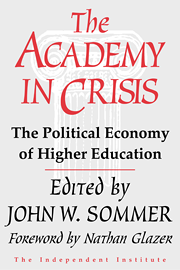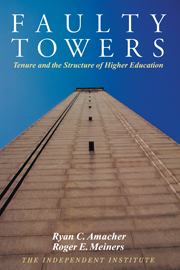| List Price: | $29.95 |
| Formats |
Hardcover |
eBook |
| List Price: | $29.95 |
| Formats |
Hardcover |
eBook |
Overview
Everyone knows American universities are more expensive and less impressive than ever. But no one has come up with a plan to fix them.
No one...
Until now.
Let Colleges Fail: The Power of Creative Destruction in Higher Education is the hard-hitting instruction manual America needs in order to save its institutions of higher learning.
The solutions proposed herein are unorthodox. They’re stern. They’re tough.
To some, they might even sound utterly shocking.
But they’re bound to work.
Richard Vedder, Senior Fellow at Independent Institute and Distinguished Professor of Economics Emeritus at Ohio University, asks the forbidden question:
Why do we subsidize universities through taxpayer-provided grants and private donor gifts when the institutions are so obviously failing America’s youth?
How can we justify this special status, while businesses offering far more useful goods and services are punished by confiscatory taxes—for simply turning a well-deserved profit?
The history behind these questions is long, winding, and complicated.
But the solutions to our current crisis are not.
In fact, they’re as time-tested as the study of economics itself.
Vedder reminds Americans of the concept of “creative destruction” (famously introduced by economist Joseph Schumpeter)—the idea that, because markets threaten to reallocate resources from unproductive to productive uses by “creatively destroying” failing businesses, markets actually help failing businesses adapt to the market’s ever-changing needs and realities.
It’s sink or swim.
And in the face of necessity, most businesses—or at least, those worth their salt—learn, however painfully, to swim.
And if universities want to survive, says Vedder, they must learn to swim, too.
But because we have cushioned them from the demands, necessities, and realities of public life, American colleges are weak, woke, and unforgivably obtuse. Their eye-stretching price tag just adds insult to injury.
Read this book and discover:
- what universities can—indeed, must—learn from the profit-making private sector;
- why big government needs to get out of the student loan business yesterday ... and what will happen if it refuses to do so;
- why accreditation, though infrequently questioned or critiqued, might actually be unnecessary ... or even bad;
- how privatizing state universities could actually open newer and more affordable finance options;
- what a healthy voucher/scholarship arrangement could look like;
- and much, much more ...
Daring in its analysis, practical in its problem-solving, and thoroughly readable in its prose, Let Colleges Fail is indispensable reading for those who want America’s colleges to thrive once again.
Contents
Introduction
- Higher Education Is Failing! Ten Cardinal Sins
- Capitalism Succeeds by Allowing Failures via Creative Destruction
- Why Are Universities Subsidized, but Firms Taxed?
- Creative Destruction and Laboratories of Democracy
- Recent Innovations in Higher Education: Good, but Not Enough
- Reducing the Government’s Role
- Reimagining Higher Education: Reducing the Federal Role
- What Can State Governments Do?
- Inside Job: Reforming Universities Within
- Other Reforms: Thinking outside the Box
- Beyond Instruction: Research and Other Activities
- Conclusions: Three Key Expressions to Guide Collegiate Reform
Notes
Index
Detailed Summary
- American universities are consistently ranked among the best in the world, but their place at the top is precarious. Richard Vedder lists ten major problems plaguing higher education:
- Enrollments have been falling for over a decade.
- Public support and confidence in higher education is very, very low.
- “Unpopular” ideas are often suppressed or ignored.
- Intellectual diversity is declining—just the opposite of what one would hope for on a college campus.
- The cost of college is exorbitantly high for both students and taxpayers.
- College students often do not even learn much at school.
- Colleges are overwhelmed by administrative bloat. Resources that might go toward teaching instead go toward the frivolous work of bureaucrats.
- Access to higher education among the poor has declined.
- The rate of return on college investments is decreasing.
- Vedder declares that colleges are very bad at “optimally” using human and physical resources.
- Despite their many failings, universities remain uniquely cushioned from the consequences of their actions. Government subsidies and bailouts, Vedder argues, are the leading cause for all the problems of today’s universities. Natural consequences of bad management are attenuated or made invisible as federal and state governments swoop in with taxpayer-provided funding (or, in some cases, private donors make many generous gifts that cushion the blow), so there is no incentive to improve. Universities also continue to enjoy generous endowments that provide steady incomes, and they are even exempt from spending at least 5 percent of their endowments to maintain favorable tax status (other nonprofits are not).
- Americans should get rid of these third-party safety nets and allow the Schumpeterian phenomenon of “creative destruction” to force colleges to fail or succeed. After all, Vedder argues, in a free marketplace, businesses are destroyed unless they turn profits and please customers. This obviously creates a very strong incentive for businesses to turn profits and please customers—in other words, to succeed. Where is that incentive for today’s universities? If universities fail in their purpose of educating students, and enough students drop out, will schools be forced to do better? The short answer is no. Thanks to federal subsidies, state subsidies, grants, gifts from private donors, and endowment funds, the tuition paid by students is just one drop in a very large bucket of cash. This means that faculty and administrative staff can assuredly count on a steady income regardless of students’ happiness, learning outcomes, graduate success, or even enrollment numbers.
- What can be done? Plenty. And much has been done already. As colleges continue to decline, we’ve already started to see more imaginative uses of technology, cheaper ways of offering high-quality degrees, and efforts to repeal government subsidies of frivolous campus bureaucracies and activist academic departments. These models are excellent alternatives to most universities, and many have seen great success. Vedder also proposes more novel initiatives, like voucher/scholarship arrangements and killing (or at least de-emphasizing) the practice of accreditation. Higher education can thrive again in America, says Vedder. But first, a lot of work must be done.
The reviews are in: American universities are more expensive, more politicized, and less impressive than ever. Fortunately, Richard Vedder, Senior Fellow at Independent Institute and Distinguished Professor of Economics Emeritus at Ohio University, has come up with a plan to fix them. His solutions are unorthodox, tough, and hard-headed. To some, they might even sound utterly shocking. But they will work.
The arguments in Let Colleges Fail are stimulated by one forbidden question: Why do we subsidize universities through taxpayer-provided grants and private donor gifts when the institutions are so obviously failing America’s youth? How can this special status be justified while businesses offering far more useful goods and services are punished by confiscatory taxes?
The history behind these questions is long, winding, and complicated. But the solutions to our current crisis are not. In fact, they’re as time-tested as the study of economics itself. Vedder reminds Americans of the concept of “creative destruction” (famously introduced by economist Joseph Schumpeter)—the idea that, because markets threaten to reallocate resources from unproductive to productive uses by “creatively destroying” failing businesses, markets actually help failing businesses adapt to the market’s ever-changing needs and realities. It’s sink or swim.
If universities want to survive, argues Vedder, then it’s time to swim. In these pages, readers will learn what universities can—indeed, must—learn from the profit-making sector. They will learn why big government needs to get out of the student loan business yesterday. They will learn why accreditation, though infrequently questioned or criticized, might actually be unnecessary ... or just plain bad. But most importantly, they will learn how America’s colleges can thrive once again.
Daring in its analysis, practical in its problem-solving, and thoroughly readable in its prose, Let Colleges Fail is indispensable reading.
Creative destruction in the economy
Few would contest that the United States boasts one of the most impressive economies in the world. But at first glance, the world of business seems dramatically unstable. By contrast, take a look at American universities. The best schools have maintained their place at the top of most international ranking lists for as long as they’ve existed. Harvard was at the top of any list of the best universities “not only in 2024 but also a hundred years ago in 1924, or two hundred years ago in 1824, or even three hundred years ago in 1724.”
What does this mean? Are universities really so much more stable than all of these titans of industry?
The short answer, Vedder argues, is no. He draws on the work of Joseph A. Schumpeter, an Austrian economist and immigrant to the United States, to understand why. Vedder defines Schumpeter’s term, creative destruction, as a “gale of destruction” that is “incessantly destroying” the inefficient businesses, but also “incessantly creating” new ones. This gale of destruction is the ever-changing set of incentives consumers and producers face in the marketplace. In response to such a gale, producers are forced to destroy what doesn’t work and create what does. Respecting this relationship, in whatever form it happens to take, is what makes market economies work. It’s why America has the best economy in the world. It’s why the list of most successful businesses keeps changing ... because life keeps changing. That no one industry remains at the top for long isn’t a sign of chaos or disorder; it’s a sign that the American economy is successfully adapting, growing, and creating.
Why creative destruction should apply to universities, too
Private enterprise relies on a “clear bottom line [that] measures ... success”—specifically, “profits and stock prices,” writes Vedder. This metric is agreed upon and understood by customers and producers alike. But that bottom line isn’t so clear in the realm of higher education, and that’s a problem. How can one know if schools are successful at what they do without a way to measure their success? For that matter, how is one supposed to settle on a metric that makes the most sense? Does one measure the number of graduates? The salaries of those graduates? The number of new donations, changes in enrollments, endowments, or measures of incoming student quality?
These questions reveal just how complicated the world of higher education really is. But without a clear way to measure success, Vedder argues, universities have little to no incentive to improve. To make matters worse, universities “depend on high tuition fees made possible by large federal student loans, direct government subsidies, substantial research grant support, and so forth. Even private philanthropic support is aided by tax breaks that the government provides donors.” This dependence, writes Vedder, essentially transforms most universities into “wards of the state.” Market forces that might otherwise demand clear metrics of success are neutralized by big government.
Everyone who studies economics knows that government control of resources leads to inefficient and wasteful uses. Fortunately, the United States economy is (mostly) free from government intervention. And yet, most of our universities depend on government intervention for their very existence. The results of this arrangement, Vedder writes, are predictable. Decline and stagnation are the norm for most American universities; “falling enrollments ... and polls that indicate waning public support” are everywhere. The time has come, Vedder argues, for universities to experience creative destruction. Let the colleges showing signs of decline and stagnation fail. Let the thriving, productive colleges succeed. The result will be better colleges—and a better future—for all Americans.
Some wins
The landscape of American higher education is a sorry sight, but Vedder is no defeatist. Neither is he blind to the ingenuity and innovation already budding in response to the need for change.
Many educational reformers lament that it is almost “impossible” to produce meaningful change in existing universities. While “impossible” is too strong a word, they have good reason for that complaint. Entrenched faculty members, labor unions, university alumni or trustees, and even highly paid senior administrators all fight moves that might reduce their power or income. For this reason, it’s often easier to simply start a new university.
And that’s exactly what many have done. New universities are much freer of “woke” ideologies, of the maintenance of massive campuses, and perhaps most importantly, of “powerful but unimaginative administrators who prefer the comfortable status quo to needed change.”
Vedder also notes that some colleges have simply refused to accept the “federal financial support that triggers a growing plethora of regulations from Washington.” Michigan’s Hillsdale College and Pennsylvania’s Grove City College have both adopted this strategy with great success. There are also religious and conservative colleges, like Ave Maria University in Florida and Pepperdine University in California, that explicitly reject the woke orientation of most institutions of higher learning.
Perhaps the most laudable accomplishment of all has been the effort to make college more affordable. That low- or even zero-tuition schools are even possible has changed the game. Interestingly, Vedder notes that some of the most affordable schools in the country are private.
Kill accreditation
Accreditation is the process by which accreditation agencies confer legitimacy on college degrees. Though technically private, accreditation agencies are exclusively authorized by the government to confer access to federal funding. The idea is to restrict federal funding and ensure it only goes toward accredited—i.e., legitimate—colleges. But is accreditation all that makes a university legitimate or illegitimate?
There’s the rub. Today, accreditation is too often used “to achieve ideological goals that reduce institutional autonomy, stifle intellectual diversity, and threaten unbridled but civil and peaceful expression of ideas.” For example, Vedder writes, “the notion ... that in order for a college to be accredited, its students must affirm some commitment to racial diversity or other goal is completely inconsistent with a vibrant learning community where individual freedom of expression is not only permitted but encouraged.” Furthermore, even without these ideological thorns, the defects of accreditation are many: “It is costly, provides little real consumer information, restricts competition, and is riddled with conflicts of interest.”
Perhaps the most striking argument of Let Colleges Fail is Vedder’s warning that unless something is done about these accreditation practices, higher education in America will continue to decline.
What more can be done?
Much good work has been done to revive higher education in America. But we must do more, argues Vedder. Some improvements can be made quite easily; others will take time. A multipronged approach is required for meaningful change.
Online learning opens a new frontier for education alternatives. This was the case even before the pandemic, which made Zoom a household name. Vedder points out that massive open online courses (MOOC) came on the scene a little over a decade ago. Though greeted with inordinate hype at first, the model has been adopted by innovative companies like Udacity. Instead of offering degrees or diplomas, Udacity’s offerings are more vocationalist and help students develop employee-marketable skills. “Perhaps [Udacity] is on to something,” Vedder writes. After all, “it is not degrees that should matter in the long run, but rather the acquisition of knowledge and skills, inside or outside a collegiate environment.” This shift in thinking seems revolutionary, but it really shouldn’t be.
Vedder also points out that the work of producing and disseminating knowledge shouldn’t be left to universities alone. Think tanks and centers, some with ties to universities and some without, have been and continue to be home to some of the world’s “most extraordinary academic achievers.” He also proposes distributing educational spending accounts via vouchers. This approach rejects the idea that taxpayer dollars ought to go wherever the government deems best. Though not politically feasible in all states, a slow move toward even a compromised or blended voucher model would be a huge improvement to the status quo.
Let Colleges Fail hits bookshelves at a critical time in American life. Universities are more ideological, more expensive, and less effective than ever.
They desperately need reform.
Vedder’s solutions, all of which are moral and workable, are as bold as they are provocative.
As they should be. This daring vision is exactly what’s needed to set things right.
Praise
“Colleges routinely fail to educate their students, produce valuable research, or foster critical discussion, but—thanks to government support—they almost never fail to survive. In Let Colleges Fail, Richard Vedder, one of the world’s greatest collegiate whistleblowers, courageously calls for accountability. If schools can’t pass the market test, government can and should let them go out of business. Letting failed institutions die, though rarely popular, is immensely beneficial for society. And few institutions have failed society more egregiously than higher education.”
—Bryan Caplan, professor of economics, George Mason University
“Failure is an essential part of the process of improvement in any industry. Higher education is no exception. Eliminating the possibility of failure, especially when combined with the federal government’s cartel-like regulatory regime that promotes mediocrity and uniformity, is a recipe for stagnation. Professor Vedder, long recognized as the most creative and bold economist of higher education, has done it again—calling for a more innovative and competitive market for higher education providers that can finally drag higher education into the twenty-first century.”
—Todd J. Zywicki, George Mason University Foundation Professor of Law, Antonin Scalia Law School at George Mason University
“Eighty years ago, there was strong case for mass subsidies for higher education. In Let Colleges Fail, Richard K. Vedder proves that the facts have changed and the old argument no longer applies. The time has come to hold universities to the same standards we hold other corporations. Vedder shows that today most universities are run for the benefit of their staff and faculty at the expense of students and society at large. Far from producing significant positive benefits, many colleges create net losses. But while many experts complain about the state of higher education, Let Colleges Fail is unique in offering a wide range of feasible reforms, big and small, that can cure higher education’s diseases without killing the patient. Let Colleges Fail is the blueprint for building higher education back better.”
—Jason Brennan, Robert J. and Elizabeth Flanagan Family Professor of Strategy, Economics, Ethics, and Public Policy, McDonough School of Business at Georgetown University
“Professor Richard Vedder has been among the foremost critics of American higher education policy for the last quarter century. His writings have repeatedly exposed the mistaken ideas behind the government’s subsidization of college attendance and the harmful consequences of doing so. In Let Colleges Fail, Vedder argues persuasively that the only way for the U.S. to get back to affordable, high-quality education is to allow the invisible hand of the competitive market to work so that schools will succeed or fail based on their ability to satisfy students. Our educational establishment is certain to hate this book.”
—George Leef, director of external relations, James G. Martin Center for Academic Renewal
“After a career as a distinguished university teacher and researcher, Richard Vedder is the perfect whistleblower. He has witnessed firsthand the growth of bloated bureaucracies and the hyper-politicization of colleges and universities for over five decades. Vedder’s diagnosis? Universities have become addicted to taxpayer subsidies to the point where students are no longer seen as the customers and student learning is no longer the focus. Tuitions rise as fast as the politicians can shovel in more money. Meanwhile, too many students are saddled with huge debts while holding worthless degrees. Vedder’s solution? Stop the subsidies and let colleges and universities compete for students, treating them as the customers they are. Those that can’t handle the competition? Well . . . let them fail!”
—Robert A. Lawson, Jerome M. Fullinwider Centennial Chair in Economic Freedom and director, Bridwell Institute for Economic Freedom, Cox School of Business at Southern Methodist University
“Let Colleges Fail examines how excessive subsidies and lack of competition stagnate American higher education—and proposes a radical market-based overhaul. Anyone concerned with improving higher education should read this book.”
—Jonathan Bean, research fellow, Independent Institute; author, Race and Liberty in America: The Essential Reader
“Richard Vedder’s Going Broke by Degree was the national wake-up call that higher ed slept through. His Thirty-Six Steps was a survival manual that too few in the sector followed. Now he has given us a must-read depiction of the consequences of complacency and the upheaval for which many once proud institutions are headed.”
—Mitch Daniels, distinguished scholar and senior advisor, Liberty Fund; former president, Purdue University
“Richard Vedder continues to be our most astute diagnostician of the structural, economic, and functional catastrophe of American higher education in the twenty-first century. He makes a wholly compelling case against further bailouts of a failing system and for allowing bad models to suffer insolvency, leading to creative destruction and to innovations. Vedder is a clear and convincing voice in the midst of our national confusion.”
—Alan Charles Kors, Henry Charles Lea Professor Emeritus of History, University of Pennsylvania; cofounder, FIRE
“Richard Vedder gives the most comprehensive assessment yet of the state, and direction, of American higher education. Bottom line: it’s not good. Vedder considers some of the background reasons for the failures and mistakes, and gives a surprisingly optimistic solution: let failure take its course! The very abjectness of the current state of education is our greatest opportunity, because parents and students are eager for an alternative. Vedder masterfully lays out the problem and outlines a path to redemption.”
—Michael C. Munger, director, Philosophy, Politics, and Economics Program, Duke University
“Richard Vedder, one of our most distinguished students of academia, has once again brought his sharp eye to our increasingly sclerotic system of higher education. Where universities should be places of robust and open debate, they are often enclaves of epistemic closure; where they are supposed to be places of intellectual discovery, students can sometimes emerge almost unscathed by additional knowledge; where they have historically been sources of upward mobility, they are increasingly inaccessible to the poor; where their focus is supposed to be on professors, students, and classrooms, their budgets have ballooned due to administrative bloat. These and other ‘sins’ Vedder identifies have led to a loss of confidence in colleges and universities reflected in declining enrollments and public opinion polls. To revitalize our system of higher education, he contends that instead of shielding schools from competition, they should be subjected to the same forces of failure and rebirth as other enterprises. Vedder comes, then, not as an enemy of American higher education but as a friendly critic who wants to insure that this extraordinary system can remain the envy of the world and a continued source of American exceptionalism.”
—Josh Dunn, executive director, Institute of American Civics at the Howard H. Baker School for Public Policy and Public Affairs
“Richard ‘Darth’ Vedder once again aims an intense beam on higher education with his fourth book from Independent Institute. Despite a tour de force critique of the Fed-fed administrative bloat and manifold other inefficiencies of universities and colleges, he offers some public-choice inspired optimism for renewal of their original purpose of advancing knowledge and spurring a ‘national revival.’ Remove government subsidies and invite free market competition to induce Schumpeterian ‘creative destruction’—of course!
—John Sommer, Knight Distinguished Professor Emeritus, University of North Carolina at Charlotte
“Something’s wrong with America’s colleges. After decades of growth, enrollment has been declining since well before the pandemic. Among those students who do bother to enroll, too many walk away without a degree; many those who stick it out and graduate do so without having learned much of value. In this readable, engaging book Richard Vedder diagnoses the problems vexing higher education and makes a compelling case that it’s past time to take many of our nation’s failing campuses off life support. For those of us who have built careers in the academy, it’s a somber yet unignorable message.”
—Jacob L. Vigdor, professor of public policy and governance, University of Washington
“Richard Vedder’s Let Colleges Fail is a treasure map. In his first five chapters, he traces the routes past both the glittering facades and the waste heaps of contemporary higher education. In the next seven, he plots the ways in which we can recover this institution that is so vital to our prosperity and national well-being. In those first five chapters, Vedder brilliantly shows that the myriad ills facing American higher education—tuition increases far above inflation, academic standards below international norms, administrative bloat, politicization, intellectual sterility—have as their common source the deep dependence of the colleges on federal money. The idea that higher education is a ‘rent seeker’ that is held captive by the government is not new, but Vedder’s presentation of it is lucid, powerful, and persuasive. When he turns to his proposals to reform education by restoring it to the true marketplace of ideas, he is sober, wise, and practical—and equally persuasive.”
—Peter Wood, president, National Association of Scholars
















